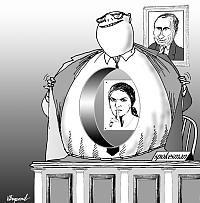 The
task of gathering information about the goings-on in the corridors of power
has always been a bit different for journalists working in Russia. As we
put out our 3,000th issue Tuesday since publishing our first paper on March
6, 1992, we reflect on how this task has changed as Yeltsin's Russia has
become Putin's Russia. The
task of gathering information about the goings-on in the corridors of power
has always been a bit different for journalists working in Russia. As we
put out our 3,000th issue Tuesday since publishing our first paper on March
6, 1992, we reflect on how this task has changed as Yeltsin's Russia has
become Putin's Russia.
Under Boris Yeltsin, stories of corruption in high levels of government
appeared almost every day in the press. There were tales of "Pasha
Mercedes," a nickname given to former Defense Minister Pavel Grachev,
of a $450,000 book scandal involving former privatization chief Alfred
Kokh, stories of a rigged Svyazinvest auction, missing IMF loans and Central
Bank reserves being squirreled away to an offshore investment vehicle
on the Island of Jersey known as FIMACO for insider trading on the government
bond market.
Even Yeltsin himself called his country a "mafia state." It
was all part of the early transition chaos, and also a weapon in wars
between rival groups fighting for spoils: government posts and choice
assets.
With Vladimir Putin came the appearance of stability and the consolidation
of power. Allegations of corruption are not used as often in turf wars,
as rival business groups toe the Kremlin line. There may now be less chaos,
more control over the budget and more lip service to Western corporate
governance standards, but that is not to say the funny business has ended.
It is just much more difficult to get at.
Most tellingly these tales of corruption no longer appear as frequently because
the sources of them have been either removed or clamped down on under Putin's
consolidation drive. One major source used to be media moguls Vladimir
Gusinsky's and Boris Berezovsky's security services. Their main political
weapon was compromising information, or kompromat. That had nothing to
do with journalism. But with the pluralism that their presence entailed,
they helped blow the lid on a number of scams. Now they have been forced
out of business and their owners pushed out of the country. Other whistleblowers
have been silenced.
This has affected how and what we can report, especially as a small
newspaper with limited manpower. It simply is harder to get at what may
or may not be happening. There are fewer sources willing to talk.
For example, Moscow Times business reporter Catherine Belton remembers
a meeting shortly after Putin's election in 2000 with an official who
had been a good source for earlier investigations in FIMACO.
"I was trying to find out more about allegations that had appeared
in earlier press reports about Putin's acting prime minister, Mikhail
Kasyanov, being known as "Misha 2 Percent," Belton said. Kasyanov
had gained the nickname because of allegations he had taken a 2 percent
cut for passing on insider knowledge to debt market participants while
he was deputy finance minister in charge of government debts.
"The official said he could not help," Belton continued. "If
before he'd been on the rampage and angry about misdoings in the government,
exploring all channels of officialdom to make his case and anxious to
hand over documents, now he shrugged and said it would not be possible
to confirm anything. 'You know, we're in a different country now,' he
said."
The Duma deputy who knew the most about Kasyanov, YABLOKO's Viktor
Gitin, was arrested in March 2000 -- the month of Putin's election
-- on charges he took bribes from a Krasnoyarsk bank. While he was under
arrest and being treated for heart trouble, his entire archive of documents
that he had collected on Kasyanov's involvement in debt deals was seized.
Later, the case against him was dropped. His archive, however, was never
returned.
The most crusading Duma deputy of them all, Yury
Shchekochikhin, who was also deputy editor of the weekly Novaya Gazeta,
died in mysterious circumstances last year. At the time, he was about
to go to the United States to meet with FBI officials about papers he
had gained during an investigation into the high-profile Tri Kita smuggling
case, which, according to his investigation, had unearthed ties to the
Kremlin and possibly a bigger money-laundering web. A few days before
his departure, he suffered an allergic reaction for an as yet unknown
reason and died.
As a class, information-sharing Duma deputies have largely been pushed
out. They were important because their status as a federal official gave
them access to official information otherwise out of reach for the public
or the press. Now Putin has a largely rubber-stamp parliament that rarely
raises its voice.
It is not that Duma deputies shut out reporters.
 |
|
Igor Tabakov /
MT
Moscow Times
reporters and editors working in the newsroom on Vyborgskaya Ulitsa
on Monday to put out the 3,000th issue since the paper was born on
March 6, 1992. |
"Once you meet them personally, they give you their cell number
and are happy when I call for comments," said Francesca Mereu, The
Moscow Times reporter who spends the most time in the Duma these days.
"Even United Russia deputies are often available over the cellphone."
But their role has changed.
"In the late 1990s, the usual way of getting any information was
actually to go the long way around by calling Duma deputies of the relevant
committees when information was needed related to the work of a certain
ministry," said Valeria Korchagina, a veteran Moscow Times reporter.
"Now, it's getting pointless to call the Duma, but often you can
actually call the ministry and get an answer."
In the 1990s, calls to ministries and other government bodies, if answered
at all, usually resulted in a "no comment" at best.
Now, they all have web sites, some of which contain reams of useful
information. The Economic Development and Trade Ministry quickly posts
all of Minister German Gref's speeches and presentations, including those
at Cabinet meetings. The Finance Ministry site contains all the annual
federal budgets. Many ministries also have extensive telephone directories
on their sites.
The use of the Internet is new under Putin. A government resolution
signed in February 2003 by Kasyanov, who was still prime minister then,
requires all ministries and other government bodies to publish information
not regarded as a state secret on their web sites.
Government decisions can now be printed from the web. Before, reporters
would have to send a request and wait for days in the hope that somebody
would respond.
Many ministries, particularly those that handle economic and social
issues, have become much more open. They have press officers with some
idea about the news and the people who make it.
Once secretive state monopolies like Gazprom and UES also have press
officers ready to answer journalists' questions in detail.
Even the Prosecutor General's Office is known to get back to reporters
promptly with information they request.
Some government agencies continue to treat reporters like the enemy.
The Federal Tax Service is not only useless as a source of information,
but also rude.
Others are just as closed as they used to be. The Federal Security Service
and Interior Ministry usually ask for questions to be sent in writing.
Their answers either never come or come weeks later.
This does not mean that dealing with their officers is always dull,
though.
Asked to comment on a report that students in a Novgorod dormitory were
eating local cats, Major Yevgeny Khvatov, deputy head of Novgorod's police
precinct No. 2, snapped back: "We lead such a life here without wages
that cops will also soon start chomping on cats."
In late October 2003, we called the regional FSB in Novosibirsk after
its agents had arrested Yukos CEO Mikhail Khodorkovsky and days later
raided the office of Novosibirskenergo.
"Why are you calling us, anyway? Aren't we the stranglers of democracy?"
an FSB official said.
When asked if it was just a coincidence that his office had been involved
in two high-profile fraud cases within a week, he joked: "We haven't
heard any news. We cannot read out here."
Under Yeltsin, the Kremlin's press service was considered to be not
too bad, because unlike others, its officers picked up the phone.
"This was enough at the time to have a reasonable reputation,"
Korchagina said. "They still pick up the phone, but have become useless.
Why? Because many others are not only picking up the phone, they actually
say something."
For reporters, the trick often is getting past the low-level person
who answers the phone.
"An FSB officer or prosecutor can be a nightmare often, while the
head of the FSB press service is eloquent when you meet him," said
reporter Guy Faulconbridge. "Kremlin spokesman Alexei Gromov could
charm a cobra when you meet him, but you have to be in the Kremlin to
see him."
Personal contacts are even more important for reporters in Russia than
they are elsewhere.
"Russians officials seem very tough at first, but when they meet
you personally their attitude changes," Mereu said. "They are
ready to give you information and their official appearance disappears.
To have a net of contacts is the most important thing in Russia for getting
information."
Reporters work hard to develop contacts with ministers and their deputies,
which then allows them to bypass the press service all together.
"Every time I go to a briefing, I ask a question," Faulconbridge
said. "Then I go up afterward and get his mobile and e-mail."
Reporters everywhere rely on the insights of political analysts, but
under Putin they have become less useful in shaping the news.
Some analysts who once boasted access to goings-on in the Kremlin now
say they have been cut off. They have less to say. The main reason, they
say, is because decisions under Putin, especially in his second term,
are being taken by such a small circle of people, they have no idea what
might happen next. In a sense, Kremlinology is back in vogue.
Thus control of information flows is better than it has ever been, as
is access to official data, but access to understanding what is really
happening is not.
Government officials are still reluctant to provide information during
crises. In some cases they even lie, as they did initially about the number
of hostages seized in Beslan.
Still, some things have become more transparent, though it is not always
to the government's advantage. Take the direct broadcast to journalists
of a Cabinet meeting last month where Finance Minister Alexei Kudrin told
Prime Minister Mikhail Fradkov they had "screwed up" on reform.
Or the live transmission of the Slavneft privatization auction in late
2002, where reporters were able to witness the farcical process of a good-looking
blonde and a good-looking brunette in high boots and carrying flowers
as the only bidders against the winning consortium, in a tender in which
the only other major contenders had already been excluded.
See also:
the original at
www.themoscowtimes.com
Freedom of
Speech and Media Law in Russia
|